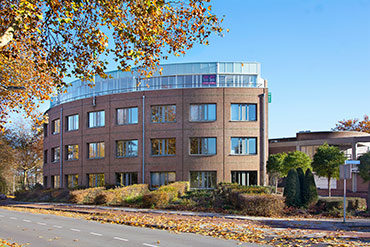Sustainable energy for the agricultural sector
A farm produces a lot of biomass, uses energy and often has access to space. This makes sustainable energy on the farm interesting. Three options are obvious: manure fermentation and wood burning.
The combination of fermentation and manure processing is also an interesting option due to the rising costs for the sale of manure.
Fermentation
Fermentation takes place in a heated reactor in which bacteria break down biomass under ideally created conditions. This creates biogas. The process takes place under oxygen-free (anaerobic) conditions.
The biogas is an energy carrier and has various applications. You can upgrade it to green gas (with the same properties as natural gas) or convert it into green electricity or green heat. Until recently, it was a challenge to get mono manure fermentation (with only company-owned manure) profitable. With the current techniques it is possible to set up a profitable system with only manure, without adding co-products.
In addition to biogas, fermentation also creates digestate. Digestate falls under the same regulations as manure.
During the fermentation process, part of the nitrogen is converted from biologically bound to mineral nitrogen. This conversion makes it faster available for the crop or results in a higher efficiency of extraction in a manure processing plant (Bio-NP).
It is important for mono manure fermentation that the manure enters the fermenter as fresh as possible. In the case of co-fermentation, the composition and price of the co-products must be carefully examined.
Biogas
Another point of attention is the sale of the biogas. The most obvious method is to convert the biogas into electricity and heat using a CHP (gas engine with generator). Often the useful application of heat is a bottleneck. Residual heat can for example be used in a cheese factory, or in a decentralized manure processing, such as the Bio-NP.
Using biogas as a heat source is also an option. The farm can use this heat itself, or sell it as a heat source for industry or district heating. The latter option is only profitable with larger amounts of biogas for which CCS Energie-advies has developed the Bio-HUB concept. Bio-HUB is a solution for the agricultural sector where several digesters are connected to a single pipeline and together supply biogas to one or more consumers in the area.
Green gas

Wood combustion
For farms with a large heat demand, such as pig, calf and poultry farmers, wood boilers are quickly profitable. Heat from wood is considerably cheaper than heat from natural gas or propane.
Role CCS Energie-advies
CCS Energie-advies specializes in feasibility studies in the agricultural sector, project management and project realization.
Are you interested in manure fermentation, manure refining (Bio-NP), a biogas network (Bio-HUB) or upgrading biogas to green gas (Bio-UP)? Please feel free to contact one of our consultants on +31 (0)570-667000 or send an e-mail to info@cocos.nl
Is fermentation on your farm feasible? Try it out and complete the biogas scan!
To keep up to date with the developments you can register for our agricultural newsletter below!





